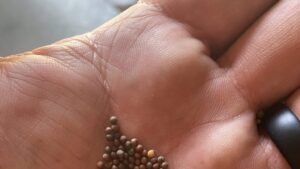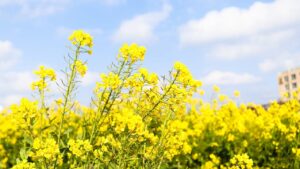In the realm of agricultural innovation, a remarkable player has emerged— carinata — an oilseed from the Brassica family, closely related to canola and mustard. This versatile crop, the cultivation of which started 6,000 years ago in Ethiopia, is poised to revolutionize the biofuel landscape, offering a dedicated industrial feedstock for biofuel production while also yielding a valuable co-product in the form of nutrient-rich meal for livestock feed.
Carinata has garnered the attention of researchers at Agriculture and Agri-Food Canada’s Saskatoon Research and Development Centre and the collaborative research team at Nuseed, headed up by breeder Rick Bennett based in Saskatoon, Sask.
“The familiarity I had with canola made the transition to working with carinata an enticing prospect,” Bennett says.
“Looking back, it’s gratifying to witness the evolution of carinata from its grassroots beginnings as a proof of concept to the current status of having a viable commercial program thriving in South America.”
That expansion continues with the recent initiation of commercial programs in the southern United States, as well as plans to venture into the markets of Europe and Australia. The overarching goal is ambitious but attainable: to cultivate between half a million to a million acres within the next five to 10 years, he says.
This remarkable crop is finding its place in renewable fuel markets. It’s particularly suited to making airplane fuel. When crushed to extract its oil, carinata yields a protein-rich meal suitable for animal feed. Its non-GMO status opens doors to European markets.
It’s important to note that as of now, there are currently no commercial acres of the crop in Canada at all, despite its potential as a rotation crop and extensive hybrid research underway at Nuseed’s research facility in Saskatchewan. To be certified as a sustainable biofuel feedstock, Nuseed’s contract production program is designed to meet the Roundtable on Sustainable Biomaterials (RSB) certification requirements, which sets global sustainability standards for biofuel and biomaterial feedstock crops.
A fundamental tenet of this certification is to ensure that production does not displace food crop cultivation, requiring commercial production to be focused in regions where the crop can be grown between main crop rotations. To date commercial production has expanded over the past four years mostly in Argentina and was introduced as a harvested contract cover crop in the southern United States in the 2022-23 season.
A significant focus of Nuseed’s efforts is directed towards scaling sustainable supply globally to meet the rapidly increasing demand for bioenergy feedstocks. With no cover crop window in Canada> certified production would be limited to the few fallow acres present here.
“It’s good for reducing erosion that fallow isn ‘t widely practiced anymore in Canada> but it makes certified commercial production to the RSB standards difficult,” Bennett says.













